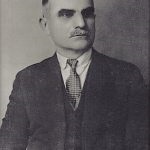 1872 – Born in Drenovo, Aleksandër Stavre Drenova, was a poet, publicist and activist of the Albanian colony of Bucharest who is also the author of the Flag Anthem, which is the national anthem of Albania. In the autumn of 1885, they arrived in Bucharest with their two older brothers. He first worked as a coal miner and apprentice, then studied privately and, for a short time, at the Faculty of Political Science of the University of Bucharest. In January 1899, he was one of the founders of the Albanian Students’ District, which in March 1902 was transformed into a society called Shpresa, founded by Asdreni and his fellow writer Kristo Dako Asdreni, who began writing poetry and publishing articles in early twentieth century. Part of the poets that Konica discovered or published in Albania. In 1904 he published in Bucharest his first collection of ninety-nine poems, Rézé the Devil, which he dedicated to Skanderbeg. He followed the traditions of Naim Frashëri’s poetry, exalted the love for the homeland, encouraged his compatriots to join the fight for liberation from the Turkish yoke. Asdren’s second volume The Dream of Tears, Bucharest 1912, published eight years later, shows a greater maturity. This collection, with ninety-nine poems as the first, is divided into three cycles: homeland, nature, thought and beauty, and is dedicated to the traveler and friend of Albania Edith Durham.
1872 – Born in Drenovo, Aleksandër Stavre Drenova, was a poet, publicist and activist of the Albanian colony of Bucharest who is also the author of the Flag Anthem, which is the national anthem of Albania. In the autumn of 1885, they arrived in Bucharest with their two older brothers. He first worked as a coal miner and apprentice, then studied privately and, for a short time, at the Faculty of Political Science of the University of Bucharest. In January 1899, he was one of the founders of the Albanian Students’ District, which in March 1902 was transformed into a society called Shpresa, founded by Asdreni and his fellow writer Kristo Dako Asdreni, who began writing poetry and publishing articles in early twentieth century. Part of the poets that Konica discovered or published in Albania. In 1904 he published in Bucharest his first collection of ninety-nine poems, Rézé the Devil, which he dedicated to Skanderbeg. He followed the traditions of Naim Frashëri’s poetry, exalted the love for the homeland, encouraged his compatriots to join the fight for liberation from the Turkish yoke. Asdren’s second volume The Dream of Tears, Bucharest 1912, published eight years later, shows a greater maturity. This collection, with ninety-nine poems as the first, is divided into three cycles: homeland, nature, thought and beauty, and is dedicated to the traveler and friend of Albania Edith Durham.
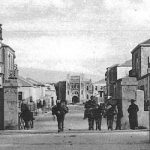 1909 – The city of Tel Aviv, Israel, is officially established. The city was founded in 1909 by Yishuv (Jewish residents) as a modern residential property on the outskirts of the ancient port city of Jaffa, which was then part of the Jerusalem province of Ottoman Syria. Originally named ‘Ahuzat Bayit’ the name of the association that founded the neighborhood, this name was changed the following year to ‘Tel Aviv’. Its name means “Show spring”.
1909 – The city of Tel Aviv, Israel, is officially established. The city was founded in 1909 by Yishuv (Jewish residents) as a modern residential property on the outskirts of the ancient port city of Jaffa, which was then part of the Jerusalem province of Ottoman Syria. Originally named ‘Ahuzat Bayit’ the name of the association that founded the neighborhood, this name was changed the following year to ‘Tel Aviv’. Its name means “Show spring”.
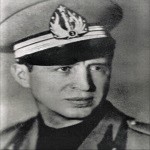 1943 – Ndok Gjeloshi died, he was a member of Nik Vuksan’s trunk of the Mekshaj brotherhood, in Shale i Dukagjin. He attended the Franciscan college in Shkodër, and then completed the Military Academy of Modena in Italy, where he received the rank of lieutenant of the Gendarmerie forces. During the governance of Noli, Ndoka received the rank of captain of the border forces and later, prefect of Shkodra. With the Triumph of Legality, he left for the Serbo-Croatian-Slovenian Kingdom, where he was a member of the “Republican Party” group created by Rexhep Shala. He emigrated to Vienna where he married Margarita, Austrian. Becomes a member of the “National Union” group. The group had agreed to plot an assassination attempt on the King during a visit to Vienna, where he would undergo some medical checks. On April 11, 1943 at 18:45, on the promenade “Viktor Emanueli III” (Boulevardi i Tirana, otherwise the street of the Train Station) Gjeloshi, was killed by a communist assassination attempt by Myslym Keta, by order of the Central Committee of the Party Communists of Albania. The funeral ceremony held in Shkodër was attended by Gjon Markagjoni, Mustafa Kruja, General Volante, commander of the Albanian Fascist Militia.
1943 – Ndok Gjeloshi died, he was a member of Nik Vuksan’s trunk of the Mekshaj brotherhood, in Shale i Dukagjin. He attended the Franciscan college in Shkodër, and then completed the Military Academy of Modena in Italy, where he received the rank of lieutenant of the Gendarmerie forces. During the governance of Noli, Ndoka received the rank of captain of the border forces and later, prefect of Shkodra. With the Triumph of Legality, he left for the Serbo-Croatian-Slovenian Kingdom, where he was a member of the “Republican Party” group created by Rexhep Shala. He emigrated to Vienna where he married Margarita, Austrian. Becomes a member of the “National Union” group. The group had agreed to plot an assassination attempt on the King during a visit to Vienna, where he would undergo some medical checks. On April 11, 1943 at 18:45, on the promenade “Viktor Emanueli III” (Boulevardi i Tirana, otherwise the street of the Train Station) Gjeloshi, was killed by a communist assassination attempt by Myslym Keta, by order of the Central Committee of the Party Communists of Albania. The funeral ceremony held in Shkodër was attended by Gjon Markagjoni, Mustafa Kruja, General Volante, commander of the Albanian Fascist Militia.
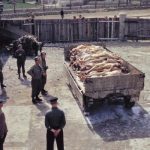 1945 – US troops liberate Buchenwald concentration camp during World War II. Buchenwald, was a Nazi concentration camp located on Ettersberg Hill near Weimar, Germany, in July 1937. It was one of the first and largest concentration camps within Germany’s borders in 1937. For nearly 8 years of existence. his as a camp, about 60 thousand internees died.
1945 – US troops liberate Buchenwald concentration camp during World War II. Buchenwald, was a Nazi concentration camp located on Ettersberg Hill near Weimar, Germany, in July 1937. It was one of the first and largest concentration camps within Germany’s borders in 1937. For nearly 8 years of existence. his as a camp, about 60 thousand internees died.
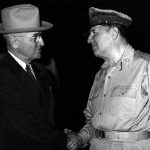 1951 – During the Korean War, President Harry Truman releases Army General Douglas MacArthur from the Army General Command. The act came after MacArthur made public statements that run counter to the administration’s policies. MacArthur was a World War II hero who was then commander of the UN forces fighting in Korea, and his relief remains a controversial topic in the field of civil-military relations.
1951 – During the Korean War, President Harry Truman releases Army General Douglas MacArthur from the Army General Command. The act came after MacArthur made public statements that run counter to the administration’s policies. MacArthur was a World War II hero who was then commander of the UN forces fighting in Korea, and his relief remains a controversial topic in the field of civil-military relations.
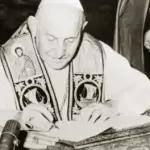 1963 – Pope John XXIII releases the Pacem into Terris, the first encyclopedia addressed to all Christians in Catholic lands, and describes the conditions for world peace in human terms. He emphasized human dignity and equality among all people and mentioned issues such as women’s rights, nuclear non-proliferation, and the United Nations, all of which have been adopted before.
1963 – Pope John XXIII releases the Pacem into Terris, the first encyclopedia addressed to all Christians in Catholic lands, and describes the conditions for world peace in human terms. He emphasized human dignity and equality among all people and mentioned issues such as women’s rights, nuclear non-proliferation, and the United Nations, all of which have been adopted before.
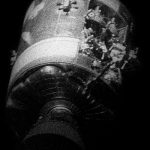 1970 – Launched in space, the Apollo 13. mission Apollo 13 is the seventh mission defeated in the Apollo space program and the third to fall on the moon. The capsule was launched from the Kennedy Space Center, but the lunar landing was halted after an oxygen tank in the service module failed two days on the mission. Instead, the crew revolved around the Moon and returned safely to Earth on April 17th.
1970 – Launched in space, the Apollo 13. mission Apollo 13 is the seventh mission defeated in the Apollo space program and the third to fall on the moon. The capsule was launched from the Kennedy Space Center, but the lunar landing was halted after an oxygen tank in the service module failed two days on the mission. Instead, the crew revolved around the Moon and returned safely to Earth on April 17th.
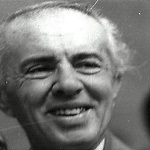 1985 – Dictator Enver Hoxha of Albania died. Hoxha is included in the list compiled by the Institute for the Study of Crimes and Consequences of Communism, which summarizes the participants who are directly responsible for the crimes of the Albanian Communist Party and the National Liberation Army, being, according to law no. 41, members of political and military structures “who have inspired, organized, ordered, executed or assisted partisan forces in criminal acts”. His forty-year regime was characterized by the disappearance of political and intellectual opposition, continuous political repression that included forced labor camps, extrajudicial shootings and executions of picketed anti-communists. The sentencing of his political opponents to death or long prison terms and the expulsion of their families from the homes where they lived and their exiles to remote villages, where they were strictly controlled by the police and State Security. Also, the communist dictatorship was characterized by Stalinist methods of annihilation of his collaborators, who threatened his personal power. Much of this suppression was done through the weapon of State Security.
1985 – Dictator Enver Hoxha of Albania died. Hoxha is included in the list compiled by the Institute for the Study of Crimes and Consequences of Communism, which summarizes the participants who are directly responsible for the crimes of the Albanian Communist Party and the National Liberation Army, being, according to law no. 41, members of political and military structures “who have inspired, organized, ordered, executed or assisted partisan forces in criminal acts”. His forty-year regime was characterized by the disappearance of political and intellectual opposition, continuous political repression that included forced labor camps, extrajudicial shootings and executions of picketed anti-communists. The sentencing of his political opponents to death or long prison terms and the expulsion of their families from the homes where they lived and their exiles to remote villages, where they were strictly controlled by the police and State Security. Also, the communist dictatorship was characterized by Stalinist methods of annihilation of his collaborators, who threatened his personal power. Much of this suppression was done through the weapon of State Security.
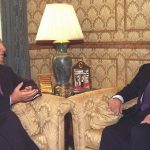 1987 – A London Agreement is secretly signed between Israeli Foreign Minister Shimon Peres and King Hussein of Jordan. Also present at the meeting were Jordanian Prime Minister Zaid al-Rifai and the Director-General of the Israeli Ministry of Foreign Affairs, Yossi Beilin. This agreement had to do with Jordan’s role in the Israeli-Palestinian conflict.
1987 – A London Agreement is secretly signed between Israeli Foreign Minister Shimon Peres and King Hussein of Jordan. Also present at the meeting were Jordanian Prime Minister Zaid al-Rifai and the Director-General of the Israeli Ministry of Foreign Affairs, Yossi Beilin. This agreement had to do with Jordan’s role in the Israeli-Palestinian conflict.
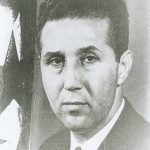 2012 – Ahmed Ben Bella, 95, dies. Ben Bella, an Algerian politician, socialist and revolutionary soldier who served as Algeria’s first president from 1963 to 1965. He would be considered by the Algerian people as one of the main exponents and heroes of the nation’s struggle for independence from French colonial occupation. Ahmed Ben Bella is considered one of Algeria’s most prominent politicians.
2012 – Ahmed Ben Bella, 95, dies. Ben Bella, an Algerian politician, socialist and revolutionary soldier who served as Algeria’s first president from 1963 to 1965. He would be considered by the Algerian people as one of the main exponents and heroes of the nation’s struggle for independence from French colonial occupation. Ahmed Ben Bella is considered one of Algeria’s most prominent politicians.






